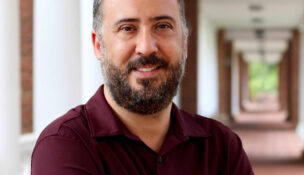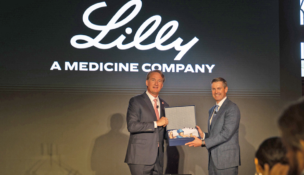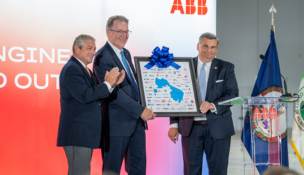Seeing green
Navy Hill developers look to Henrico for newest project
Gary Robertson //February 28, 2021//
Seeing green
Navy Hill developers look to Henrico for newest project
Gary Robertson //February 28, 2021//
You can almost see the dollar signs flashing as John Vithoulkas talks about the revenue that he hopes will flow to Henrico County from the $2.3 billion GreenCity development, anchored by a 17,000-seat, $250 million arena.
“Once it’s running and out of the ground, fully built, it will be producing revenues greater than our top 10 taxpayers combined,” says the county manager.
The project, which promotes economic development and environmental sustainability, is expected to have a total of 2,300 residential units, two 300-room hotels, 2.2 million square feet of office space and 280,000 square feet of retail by buildout in 2033. Protected trails and an interlinking series of parks also are part of the mix.
The proposed site — the 204-acre property that includes the former headquarters of Best Products Inc. in western Henrico — does not currently produce tax revenue for the county.
Developing GreenCity are two familiar names: Susan Eastridge, CEO and president of Fairfax-based Concord Eastridge Inc., and Michael Hallmark, founder of Los Angeles-based Future Cities LLC. Both were master developers of the $1.5 billion Navy Hill project rejected by Richmond City Council last year.
Richmond Mayor Levar Stoney championed the proposed arena and mixed-use development, but it was torpedoed by a council majority who feared the project would be a risk to taxpayers and siphon too many tax dollars away from other priorities, such as schools.
Now comes GreenCity, which tops the price tag on the failed Richmond project by $800 million, but with one big difference.
“No public bonds, no public debt, no risk to taxpayers,” is the way Vithoulkas puts it, a theme echoed by members of the Henrico Board of Supervisors, who endorsed GreenCity when it was announced in December 2020.
Construction of the arena will be financed by a sale of about $250 million in private bonds, which will not require approval by voters. GreenCity is asking the county to establish a Community Development Authority (CDA) to sell the bonds.
Certain taxes generated within the development would then be used to make debt payments over a period of 30 years. Henrico purchased the 93.6-acre Best Products tract in 2011 for $6.2 million, and it anticipates selling the property to GreenCity for the same price to help push the project along.
Once the debt is retired, all taxes generated by the development, estimated by the developers at $20 million annually, would flow to Henrico’s general fund.
“There is no scarlet letter at the end of the day … that is associated with Henrico County, if anything happens with these bonds,” Vithoulkas emphasizes.
When GreenCity was unveiled after months of behind-the-scenes negotiations, Vithoulkas was quick to explain that CDAs are not new in the county, having been used in the development of Short Pump Town Center, White Oak Village and Reynolds Crossings.
“In Henrico, we have extensive experience with CDAs and understand how they can help deliver large-scale development projects that are rich with amenities and potentially transformative for the community,” Vithoulkas says.
Andrew A. Painter, an Arlington-based attorney whose firm, Walsh, Colucci, Lubeley & Walsh PC, has represented CDAs before the Supreme Court of Virginia — including a case involving Short Pump Town Center — echoed Henrico’s success at forming and working with community development authorities.
“The county maintains a relatively strong economy and AAA bond rating,” Painter says. “All this signals that the county has a good track record with these entities and is sophisticated enough to thoroughly evaluate and form fiscally responsible CDAs.”
While the former Best Products headquarters would form one part of the project, the other part would involve the 110.6-acre Scott Farm property, which is now in a land-use program.
“It’s being farmed right now,” Vithoulkas says. “We tax it at $600 to $700 an acre, but the value is significantly higher.”
Although the arena will have separate financing, the greater part of GreenCity will rely on attracting private investors in four separate capital raises.
Eastridge, whose company has done about $20 billion in development during the past 15 to 18 years, doesn’t anticipate any problem in attracting investors for this project.
“The thing that’s really going to be so attractive right now is the sustainability level of GreenCity,” Eastridge says.
“Most of the big institutional players — which are the Goldman Sachs, the JPMorgan Chases — they’re putting together really big sustainability funds, and they need good places to put that money because the investors who are investing want to see sustainable development happen.”
Related content:
- Central Virginia’s recent deals chart
- Moving forward: Tough year for some sectors, but region sees progress
r



















